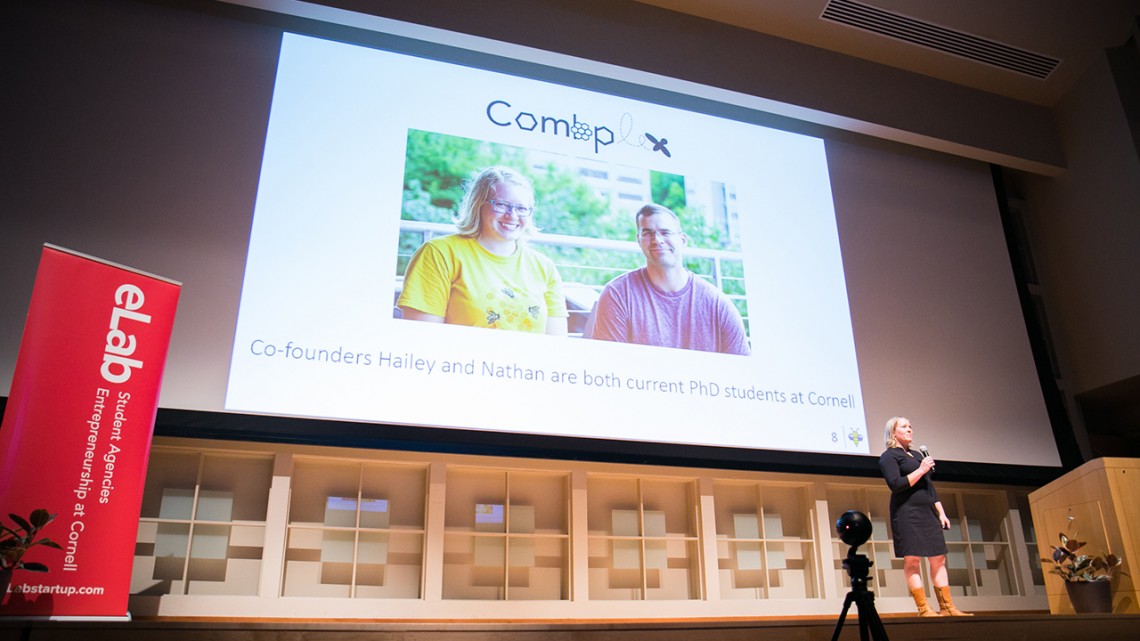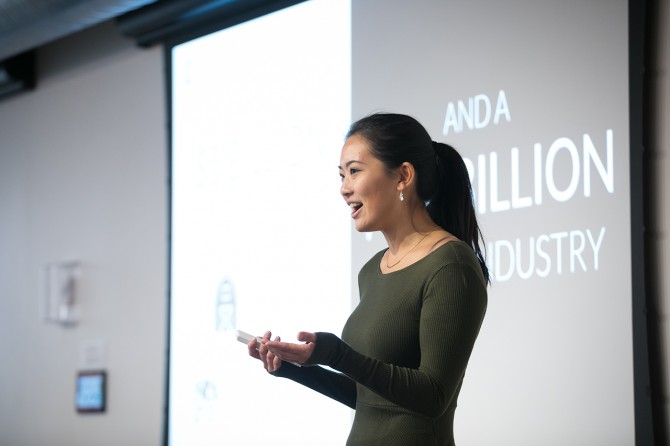
Hailey Scofield, a doctoral student in neurobiology and behavior, describes Combplex, the company she co-founded with doctoral student Nathan Oakes, April 19 at the Celebration entrepreneurship conference. Combplex was named Student Business of the Year at the conference.
Students display entrepreneurial spirit in competitions
By Susan Kelley
More than 100 students who participated in three business competitions and a demonstration embodied the spirit of entrepreneurship at the annual Celebration conference at Cornell April 18-20.
“The quality is always going up,” said Zach Shulman ’87, J.D. ’90, director of Entrepreneurship at Cornell, which hosts Celebration. “Students are thinking about starting companies earlier, so they tend to be better prepared.”
Winning the Student Business of the Year competition and $5,000 was Combplex, which provides real-time remote monitoring and minimal diagnostics for honeybee colonies.
Beekeepers lose about $80 million per year due to the death of their colonies. And that doesn’t count the millions of dollars in annual crop revenue, from apples to almonds, that are dependent on honeybee pollination.
“This technology allows beekeepers to prioritize the colonies that are in the most urgent need of intervention, minimizing colony losses for large-scale commercial beekeepers,” said Nathan Oakes, a doctoral student in computational biology, who co-founded the company with Hailey Scofield, a doctoral student in neurobiology and behavior.
Combplex was a member of the eLab student business accelerator, meaning Oakes and Scofield went through six months of course work to build their company.
“This competition particularly was an opportunity to explain a problem, and our solution, framed in a way that mattered to members of the investor and business communities – two groups that scientists don’t often talk to,” he said. They will use the award to produce prototypes for local field testing this summer, he added.
The company also won $5,000, matched by an additional $5,000 from Cornell’s Center for Technology Licensing, and second place in the Cornell Venture Challenge, a competition run by Big Red Venture Fund for more fully formed startups.
The winner of that competition, and $25,000, was Soundskrit, co-founded by Sahil K. Gupta ’15, M.Eng. ’16. The company makes smart microphones for devices and hearing aids, using a microphone that separates sounds coming from multiple directions and zooms in on the sounds the hearer cares about, providing improved speech recognition and higher-quality recordings. They use a bio-inspired design that measures a sound’s particle velocity instead of its pressure.
Coming in third in the Cornell Venture Challenge was Crater, created by a Cornell Tech team to offer templates and tools for grassroots reporting on local issues.
In the Big Idea competition, where students pitch ideas as opposed to representing actual companies, Cowscope was the winner in the for-profit category, winning a $3,000 prize. Its idea is to target bovine mastitis contamination, which affects 30 percent of dairy farms each year. Their solution? A portable microscope system with fast analytics to help famers quickly diagnose individual animals. A camera takes a picture of the sample slide and analyses it via smart phone.
The technology could be used in beer brewing and other food and beverage industries, said founder Sachiye Koide ’18, a biological engineering major.
“With my $3,000, I hope to continue building a prototype of my idea – maybe making it smaller and more useable for the farmers,” said Koide. The team included sisters Monica Ong ’19 and Amanda Ong ’19 and Swathi Chakrapani ’19.
AMPS won first place in the nonprofit category, and $3,000, for its idea for a faster, easier way to charge mobile devices in developing countries: a solar-powered hub where owners can swap out their discharged batteries for 50 cents. “We have even considered doing a pilot program at Cornell, to see how people interact with the system,” said team member Alex Li ’20, an electrical engineering major. Other team members are Rohan Patel ’20 and Shen Lee ’20.
Teams from eLab shared the stories of their ups and downs at eLab Demo Day, April 19.
Brynne Merkley ’20 and Colby Triolo ’19 talked about launching their Worldwide Travel Network, a platform that matches travel partners who share the same schedule, budget or interests.
Jamie Kim ’19, founder of granola company Bumble and Butter, told the crowd that her company has now sold 5,000 bags of sweet and savory granola and is being sold on Amazon Prime, selling out on their first day of launch.
And Antithesis launched a Kickstarter campaign for their Grabanzos, a chocolate-covered chickpea snack.
The founders of Dexter, a product to help people understand and acquire cryptocurrency, described how they discovered there wasn’t a need for their product – and how they are now exploring a completely different idea.
“It’s not about persisting in selling the product that you want to sell, it’s about persisting in finding out what customers actually want,” said Tom Schryver, executive director of Cornell’s Center for Regional Economic Advancement and an eLab instructor. “When a team realizes they’re pushing the wrong product, stops at the right time and finds the right thing to do, that’s just as worth celebrating as every successful team you’ll see here today.”
Contributors to this article were Kathy Hovis, a writer for Entrepreneurship at Cornell, and Debra Eichten, marketing strategist at Entrepreneurship at Cornell.
Media Contact
Get Cornell news delivered right to your inbox.
Subscribe

